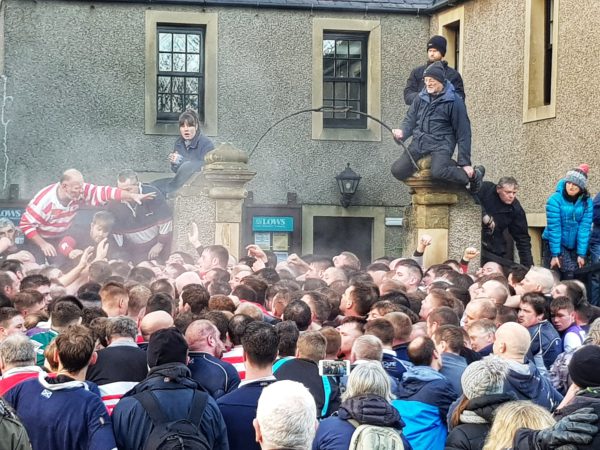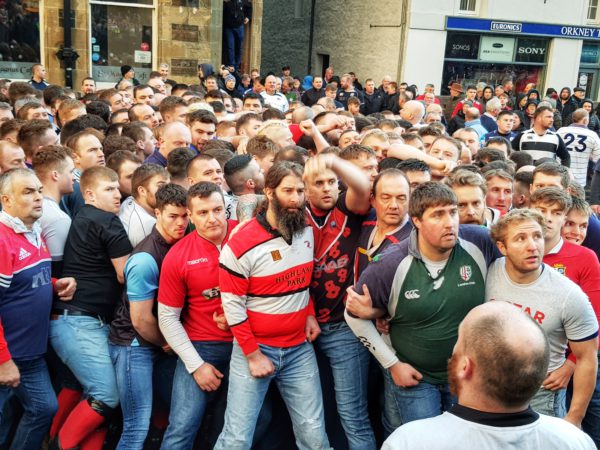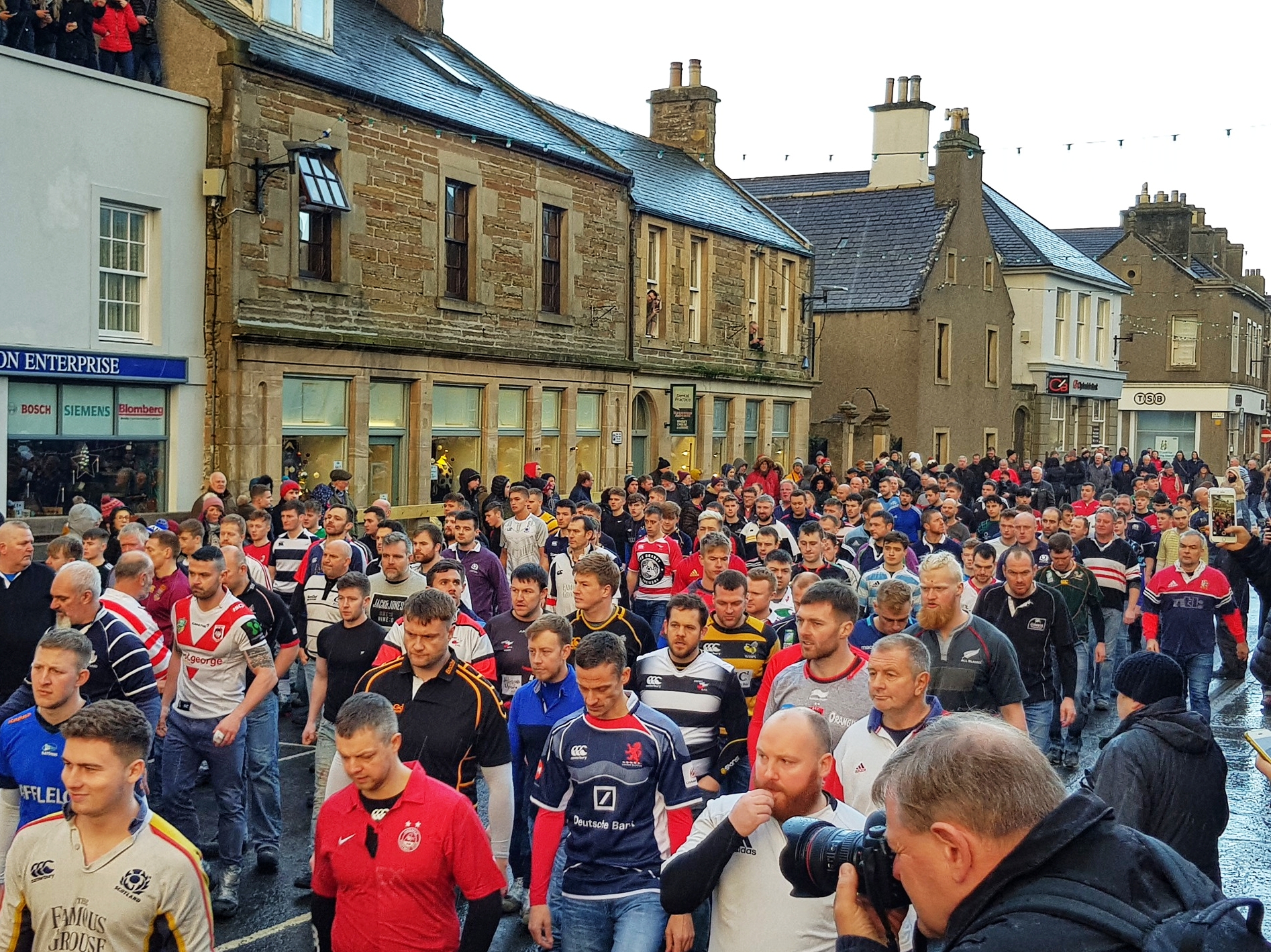Since at least 1850, The Kirkwall Ba’ has been a regular sporting fixture in Orkney’s festive calendar. Orcadians don’t indulge in the same Hogmanay celebrations and Christmas Day dinners that take place around the rest of Scotland. Instead, friends and families gather in the town centre to socialise and watch the highly physical matches, which can last an average of 5 hours or more, being played through the historic streets of Kirkwall and is unique to Orcadian culture as Susanne Arbuckle explains.
On the days leading up to Christmas, the sound of hammering reverberates around the historic streets and closes of Kirkwall. The sight of householders and shopkeepers barricading their windows and doorways with heavy-duty timber is a sight likely to fill first-time visitors to the capital of the Orkney Islands with apprehension. For Orcadians, these well-rehearsed annual preparations stir up excited anticipation as they signal the final countdown to The Ba’ season.
Since 1850, The Kirkwall Ba’ has been a regular sporting fixture in Orkney’s festive calendar, although its origins date back centuries before that. Games take place twice a year, on Christmas Day and New Year’s Day, between two sides known as ‘Uppies’ and ‘Doonies’. When babies were born at home, the side a player joined was dictated by the side of the town he was born in, either north (Doonies) or south (Uppies) of Kirkwall’s Mercat Cross. With most births now taking place in hospital, players choose their own allegiance, usually guided by family loyalty.
Festive greetings

There are two matches played each day starting with the Boy’s Ba in the morning. Seen as a rite of passage for many Orcadian males under 16, this is generally a smaller and less brutal event than the Men’s Ba’. It is an opportunity for local youngsters to serve their apprenticeship in a game that has often been played by generations of men in their families before them. In the afternoon, as the majority of Scotland sits down to enjoy traditional Christmas celebrations or recover from Hogmanay excesses, hundreds of Orcadians gather in front of the 12th century St Magnus Cathedral for the Men’s Ba’, the main event of the day. For many, The Ba’ is an opportunity to exchange festive greetings with family, friends, neighbours and colleagues, making it as much a social occasion as a sporting spectacle.
As game-time approaches, rival male factions of Uppies and Doonies advance from their respective ends of the town in a uniform of rugby tops and steel toe-capped boots, with several hundred players meeting in the middle ready for battle. Supporters roar encouragement as both sides lock themselves in a tight mass facing the Mercat Cross. The crowd cheers as the 1 pm cathedral bell chimes and a locally handcrafted leather ball, known as the Ba’, is thrown into the baying pack and immediately disappears.
What follows is a highly physical and drama-filled game of mass street football that has no real rules and no time limit. Each side attempts to force their way through the historic narrow streets to reach their designated goal at equidistant ends of Kirkwall. For the Uppies, the goal is against an unassuming wall in the south end, for the Doonies, it is in the chilly waters of Kirkwall Bay in the north end. On rare occasions, the game has been won in minutes but most games are played well into the winter darkness, lasting an average of 5 hours or more.
Close to the heart of any Orcadian

Long periods of the scrum making little progress are interspersed with bursts of high drama, excitement, and thunderous stampedes when a player manages to make a break with the Ba’. Although it is termed street football, feet are rarely used, with hands being the preferred means of passing. Often subterfuge is required, with players smuggling the ball out under their jersey. The sheer exertion of the pack generates clouds of steam, while every obstacle – be it a wall, roof, or building, is overcome in relentless pursuit of the goal. The wooden barriers prevent players from being forced through glass windows and doors although accompanying volunteer medics are on hand to treat other inevitable injuries that include men passing out from lack of oxygen to having bones broken in the crush.
Veteran participants jostle around the fringes directing the younger players and as the adrenaline rises, some year-long personal grudges are settled with fisticuffs. Onlookers pursue the game as it manoeuvres around the town, sometimes tediously slowly, other times at a surprisingly high pace. Seasoned spectators keep a safe distance, and their exit options open in anticipation of a sudden charge in their direction. Following who has possession of the ball is a challenge for both competitors and bystanders.
As the hours tick by, clothing becomes increasingly ripped and tattered in the mayhem, and friends and family offer up supplies of food and water to boost exhausted players. Other than a pre-match team talk and a good night’s sleep, there is very little preparation before game days, although it is obvious to anyone watching that a high level of fitness is needed to endure the hours of punishing physical activity. Marcus Shearer, a 25-year ‘Doonie’ veteran summed up the experience as “hard” with players needing to be “committed and observant for anything and everything that can happen”.
In the end, one side is eventually victorious and the winning team’s song is chanted loudly through the streets, but the competition doesn’t quite end there. The overall individual winner of the Men’s Ba’ is fiercely debated by his teammates, although only long-term committed players make the shortlist. Once the victor is decided, he is duly hoisted above the singing crowd with his coveted ball in hand. His name is added to the legendary list of Kirkwall Ba’ players and in return for receiving the ultimate honour, he is responsible for hosting the afterparty. The celebrations last many more hours and occasionally they have been known to go on for days. Asked about what it means to those that play in The Ba”, Marcus replied, “It means the world, carrying on a tradition which is close to the heart of any Orcadian” and it is that local pride and passion that continues to attract generation after generation of Kirkwall men and boys prepared to risk life and limb for a leather ball.

